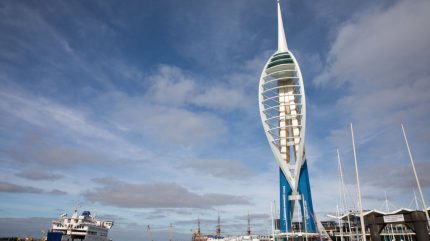

Portsmouth – or Pompey as it is known locally – is a coastal town on the south coast of England that is largely built upon Portsea Island. Situated just 120km outside of London, it is the UK’s only island city.
The city is also intrinsically tied to the Royal Navy, with it being home to the oldest navy base and one of the oldest dry docks in the world. Its port status and proactive city council also mean that Portsmouth is largely responsible for the UK’s banana intake.
Brexit, Covid and crossing problems
With a rich history, coastal views and proximity to London, Portsmouth has a lot going for it. However, the one-two punch of Covid and Brexit poses a threat to sectors such as tourism and hospitality, and the functionality of the city’s port.
Gerald Vernon-Jackson has been a councillor in Portsmouth since 2003 and was leader of the council from 2004 to 2014. He identifies the city’s cultural sectors as being particularly badly hit. “We have a lot of people involved in the cultural industries, and their livelihoods have disappeared,” he says.
We have to try to get over the problems that our government has created for us, and Portsmouth is a great place to do that because we have such good connections across the EU. Gerald Vernon-Jackson, Portsmouth City Council
In the 2016 EU referendum, Portsmouth voted to leave the EU with 58.1% of the vote. This is a decision Vernon-Jackson doesn’t agree with. “It is a remarkably stupid thing we have done… We got it wrong, and the UK economy will suffer for it for many years.” However, he is keen to focus on problem solving, saying: “It doesn’t mean that all trade has to cease. It just means we have to try to get over the problems that our government has created for us, and Portsmouth is a great place to do that because we have such good connections across the EU.”
How well do you really know your competitors?
Access the most comprehensive Company Profiles on the market, powered by GlobalData. Save hours of research. Gain competitive edge.

Thank you!
Your download email will arrive shortly
Not ready to buy yet? Download a free sample
We are confident about the unique quality of our Company Profiles. However, we want you to make the most beneficial decision for your business, so we offer a free sample that you can download by submitting the below form
By GlobalDataThe EU-facing Portsmouth International Port has been in operation since 1976, and has grown from its offering of a single route to France to now boasting the most destinations of any British port. However, Brexit is posing challenges here, with Operation Transmission – a project designed to mitigate potential traffic disruption on the approach to Portsmouth International Port – struggling in some areas, and finding assistance from the government hard to come by.
Of this, Vernon-Jackson says: “One of the things we put in for was a border crossing point for animals going across [to Europe] for breeding programmes. We were the only port in the country that was prepared to do it. [Portsmouth City Council] can’t afford the £5m to build this and the government hasn’t given us a penny to do it, so that won’t be built, and that trade will cease.”
Although logistics at the port may be impacted, Portsmouth appears to be quite well protected from the Brexit fallout. According to the New Statesman’s Brexit Vulnerability Index, Portsmouth is ranked as the UK’s 366th most vulnerable location out of 379.
ICT rises in prominence in Portsmouth
Between 2000 and 2018, the gross value added of Portsmouth’s information and communication technology (ICT) sector has increased by a whopping 188.9%. This is, in part, due to the high-tech roles attracted to the region through the presence of the Royal Navy, as well as a number of other high-tech companies.
“We have got a record of engineering and high-tech work,” Vernon-Jackson explains. “We are the headquarters in the UK satellite industry.”
The opening of the IBM North Harbour Complex in the 1970s planted a seed that has cultivated a tech-savvy workforce. The business park now belongs to Portsmouth City Council, which bought it in 2019 from property firm Highcross.
Such a move by the council is part of a wider strategy, as Vernon-Jackson explains.
“As a council, we are fairly interventionist, so we own a lot of land and do a lot of development,” he says. “We own all of our own council housing, the port and companies at the port, and our own motorway. The tradition in Portsmouth is for the council to be pretty interventionist in the economy.”
Another quirkier fact connected to the council concerns bananas. “A company that we own imports 65% of all bananas eaten in the UK,” says Vernon-Jackson. “We import 25 million a week.”
A manufacturing stronghold
Away from bananas, Portsmouth’s ICT prowess is interconnected with another sector in which the city has a particular strength. Although growth has dipped in recent years, Portsmouth’s manufacturing history is impressive, boasting a vast array of activity. Sub-sectors include maritime, aerospace, environmental tech and advanced manufacturing.
With Portsmouth being home to two-thirds of the Royal Navy’s surface fleet, it is perhaps inevitable that the city has significant maritime and marine industry activity. In 2017, the largest ship ever built by the Royal Navy – a £3bn aircraft carrier – was built in Portsmouth, attracting investment of £120m to its naval base.
The city council is supported by the Portsmouth Manufacturing and Engineering Business Cluster group. The group consists of heavy hitters in the advanced manufacturing space including GKN, Airbus, BAE Systems, H&S Aviation, Formaplex, Portsmouth Aviation and Pall Europe.
This collaborative approach can be seen in other areas too. “Portsmouth doesn’t exist on its own, it exists with others,” Vernon-Jackson stresses. This is a reference to the wider Solent region, which includes Portsmouth, the Isle of Wight, Southampton and the New Forest. An example of this collaboration is the alignment of renewable energy aims within the region’s manufacturing industry.
“One of the things our port does is import the wind turbine blades, which are manufactured on the Isle of Wight, before they go onto the turbine,” says Vernon-Jackson. “Moving in some of those greener technologies is really, really important.”
Equality and education challenges
Vernon-Jackson is honest when it comes to the challenges Portsmouth faces. “As a city, we are quite poor,” he says. “We have high levels of deprivation, often very close to each other. Three miles is the distance between the heart of the city – which is the poorest area – and Drayton and Farlington, which is the richest area, and life expectancy varies in that three miles by ten years.”
When looking at the average gross weekly pay for Portsmouth, it is substantially lower than its nearby counterparts in the south-east and still considerably lower than the British average. The city’s educational qualification rates are lower than the British average too.
Vernon-Jackson speculates on the attitude towards education among young Portsmouth residents. “I think our history is a bit of a problem for us,” he says. “When everybody could get a job in the dockyard – whatever qualifications they had – the need for youngsters to do well in school didn’t exist.”
Despite such issues surrounding its educational performance, the city is home to the University of Portsmouth, which teaches approximately 25,000 students. The university offers a wide spread of subjects, but business studies, social studies and engineering and technology account for the largest class sizes.
The university also opened its Future Technology Centre in 2018, which is designed to allow students and researchers the chance to model and build prototypes using additive manufacturing machines. It also has an advanced testing and imaging facility and conference space.
Achieving sustainability at home
From 2014 to January 2020, Portsmouth’s council invested more money into solar energy than any other in the UK. According to data acquired in a freedom of information request by the Solar Centre, some £4.9m has been spent on the technology.
Despite this, Portsmouth does not rank particularly highly within the UK for either solar sites or capacity. “We don’t have fields that you can put solar farms on,” Vernon-Jackson says. “[Instead] we have been putting them on council-owned buildings all over the place. So, it is fewer solar panels than if you were to cover a field in them, but it has been very successful in terms of generating income and reducing carbon dioxide.”
Vernon-Jackson highlights the council’s use of solar panels and Tesla batteries in council houses as a clever environmental solution. “For people who have very low incomes in council housing, they can’t afford to turn the heating on. So, having the solar energy and Tesla batteries is a step towards doing that and is a way of keeping people out of poverty.”
How Portsmouth is regenerating
There are a number of developments in Portsmouth, including a city centre regeneration and the Tipner West development. Both, however, have suffered delays due to the Covid-19 pandemic.
Vernon-Jackson agrees that Portsmouth city centre could use some work. “I have been here for almost 20 years, and effectively the only construction of the city centre that we have had is our student halls of residence. We have got lots of stuff that we would like to do, but I think we have to be realistic and honest to say we haven’t achieved it.”
The Tipner West development, which aims to rejuvenate what Vernon-Jackson calls “derelict land” into new housing, has also been pushed back. “I hope we will get some development on that soon,” he says. “It would have been developing now if Homes England had allowed us to build on it, but it wouldn’t work with us.”
There are challenges, but certainly opportunities for development in Portsmouth. When asked what his statement to would-be investors would be, Vernon-Jackson says: “Portsmouth is an incredibly interesting place to be based. It has the enormous benefits of being on the coast with a really strong cultural offer, close to London, with a great university. It is a really great place to invest, live, work and visit.”
For more of Investment Monitor’s coverage of the UK’s cities, read through our Future of British Cities series:
- Aberdeen
- Belfast
- Birmingham
- Bradford-Leeds
- Brighton
- Bristol
- Cardiff
- Coventry
- Dundee
- Edinburgh
- The East Midlands
- Glasgow
- Hull
- Kent
- Liverpool
- Manchester
- Newcastle and the North East
- Norwich
- Plymouth
- Portsmouth
- Reading
- Sheffield
- Southampton
- Stoke-on-Trent
- Swansea
- Wolverhampton






